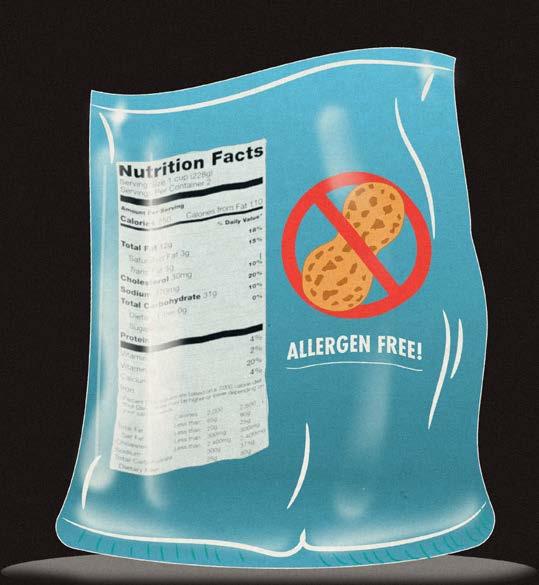
7 minute read
Research & Technology pages 5 to
from 2 February 2022
Connection between the two is expected to have increased during the pandemic
RESEARCH & TECHNOLOGY
Michael Campbell, staff Families in Manitoba with certain food allergies experience food insecurity at a rate almost twice that of families without food allergies, according to a recent finding from research at the University of Manitoba. The study was conducted before the COVID-19 pandemic and the disparity is believed to have increased during the pandemic.
Jennifer Protudjer, endowed research chair in allergy, asthma and the environment and assistant professor in the department of pediatrics and child health, is recruiting participants for a study examining the intersection of food allergies and food insecurity.
Protudjer was previously involved in a project at Karolinska Institutet in Sweden as a post-doctoral research fellow which looked at the costs of allergies for the families experiencing them. This research included outpatients from an allergy clinic in Stockholm, Sweden. Protudjer found families were bearing a cost burden between $6,000 to $7,500 in Canadian dollars per year, representing a significant burden to families with allergies.
When Protudjer joined the University of Manitoba in 2018, she wanted to know if this phenomenon was happening in Manitoba and what could be done to reduce the financial burden. Prior to the pandemic, Protudjer found that families with allergies in Manitoba face an excess cost of $2,400 per year — about $200 per month.
“If that was happening at a time prior to the pandemic, when food prices were a bit more stable [and] unemployment was lower, what’s happening during the pandemic?” Protudjer said.
According to Protudjer, these issues, along with food shortages, have likely been exacerbated by the pandemic.
“Since the start of the pandemic, food prices have probably gone up close to 10 per cent,” Protudjer said. “That’s 10 per cent on top of an additional excess burden that these families with food allergies were facing prior to the pandemic.”
One of Protudjer’s current projects is looking for low-income parents caring for a young child with a milk allergy to participate in the study. The project will deliver dairy-free food products on a biweekly basis representing a value of approximately $200 per month. The Protudjer lab will then attempt to determine whether this intervention improves the food security and mental health of the participants.
Protudjer’s research has made alarming findings regarding the extent of the financial impacts of living with allergies. At the beginning of the pandemic, families with an allergy to staple foods — including milk, egg or wheat — had nearly twice the difficulties finding foods that met their needs than families with allergies to non-staple food products.
Among families that were having difficulties finding enough suitable food, families spent an average of $113 more per month than families with allergies that were still able to find enough food. All these difficulties during the pandemic were above and beyond the increased baseline costs for people living with allergies.
Protudjer’s research also looks at the psychological impact of living with allergies. Protudjer has participated in research projects exploring this topic in Manitoba, nationally and internationally. She has found the psychological burden exists both for the person living with the allergy, their family and, by extension, their community.
“What we see is that families, particularly moms, have much lower health-related quality of life than moms of children who don’t have [a] food allergy,” Protudjer said.
“And that’s probably because it’s the parents who are taking on the burden for themselves.”
Protudjer’s connection with her research goes all the way back to the beginning. At two months old, she was diagnosed with an allergy to fish and shellfish.
“Growing up in Manitoba, as a largely landlocked province, it wasn’t difficult to manage,” Protudjer said.
“But certainly, it was uncommon when I was small to have any allergies. And as I got older, allergies were something that we discussed more.”
In fact, many people that have allergies are diagnosed early in life. According to Protudjer, allergies to milk and egg products typically appear first in childhood, often because they are the first foods to be introduced to infants’ diets. Other common allergies include peanuts, tree nuts and shellfish.
The prevalence of allergies is currently on the rise, but researchers are uncertain of the exact reason for this.
“Increasingly we see allergies to different seeds, such as sunflower seeds or chia seeds as well,” said Protudjer.
For this reason, more allergy research needs to be conducted. Protudjer suggests this research should be done in Manitoba.
“For me, the patient has to be at the heart of what we do — the family has to be at the heart of what we do,” said Protudjer.
“And so, if resources were unlimited, what I would love to do is have a centre for excellence, if you will, here in Manitoba.”
/ staff Dallin Chicoine / graphic
research@themanitoban.com
Deaths on border necessitate immigration reform
Manitoba’s hostility toward migrants causing unnecessary harm
COMMENT
Lucas Edmond, staff
Most people have confronted death in one way or another. Whether it be surviving the loss of a loved one or consoling those experiencing the deep-cutting pain of grief, everybody will eventually have to endure its universal grip on our existence. Those who have felt the mourning that losses evoke tend to question how they can honour the lives of those who have passed on, what kind of death they wish to have, how they want to be remembered and who they want by their side when the time comes. These are uncomfortable thoughts — largely because dying will never be a comfortable process. Nevertheless, most people can agree that the ideal death would be painless, with loved ones around you.
We can only hope that these solaces will be afforded to us. In an ideal world, we’d be able to avoid the unnecessary pain of abrupt or violent deaths. However, many victims find themselves beholden to social and political powers beyond their control.
On Jan. 19, the bodies of Jagdish Baldevbhai Patel, his wife Vaishaliben Jagdishkumar Patel and their son and daughter Dharmik and Vihangi were found and recovered in southern Manitoba following a failed attempt to cross the U.S.-Canada border. Autopsies of the bodies found the family died from prolonged exposure to the cold.
It would be hard to think of a more difficult death. The whistling wind blowing blinding snow into the air, frigid temperatures biting exposed skin, an eerie stillness that can be deceptively peaceful, yet far from safe. Manitobans may know the danger of these conditions, but few have been exposed to them to the point of death. Just the thought of jumping into a cold car in the morning on the way to work is enough to make most Manitobans’ skin crawl.
These deaths were far from the family’s choice. Economic instability or political persecution in home countries, mixed with the U.S. and Canada’s unsupportive and often oppressive immigration systems, force the hands of migrants seeking asylum. When people are refused entry or refused humane conditions upon entry, gambling on death becomes a risk that migrants are willing to take in the pursuit of safer lives.

Although this family was on their way to the U.S., Canada’s immigration system is just as guilty of promoting dangerous treks across the border and the exploitative conditions migrants face via their segregation from so-called official status.
Authorities have arrested a man — believed to have connections to a human trafficking network — who was caught transporting other Indian nationals across the border in his van. Investigators believe the Patel family was separated from this group and attempted to walk across the border, eventually leading to their deaths.
These traffickers would be out of business if our immigration system weren’t so rigid. By restricting the right to move freely across these arbitrary lines, Canada and the U.S. create opportunities for violent and exploitative organizations that prey on people’s desperation.
While it is uncommon for migrants to make it across the Canadian border without being stopped and having their documents checked and recorded, the conditions created by this process harm migrants’ livelihoods. Migrants tend to resort to seeking temporary residence through Canada’s
Temporary Foreign Worker Program. This program makes migrants’ temporary status dependent on their ability to hold a job. As a result, employers exploit this power to offer migrants lower wages and abuse basic labour rights. Further, the lack of status creates significant barriers to accessing the health-care system, education or emergency services. The whistling wind blowing snow into the air and blinding the vision of trekkers; frigid temperatures that feel like the cold is biting exposed skin; an eery stillness that can be deceivingly peaceful, yet far from safe Fear of reprisal tends to loom heavily over migrants’ heads and Manitoba is guilty of reinforcing this precarious environment. Various cities across Canada, like Toronto, Vancouver and Montreal, have introduced Access Without Fear legislation to avoid the systemic violence associated migrant status. These policies encourage access to bank accounts, health care and various other services by making it illegal for municipal staff to ask for documentation of people’s status. For years, various migration advocacy groups have called attention to Winnipeg’s need for such a policy, and the recent events that unfolded on Manitoba’s border reinforce this argument. People are dying, and the sad irony is that they are dying to access safer conditions.



